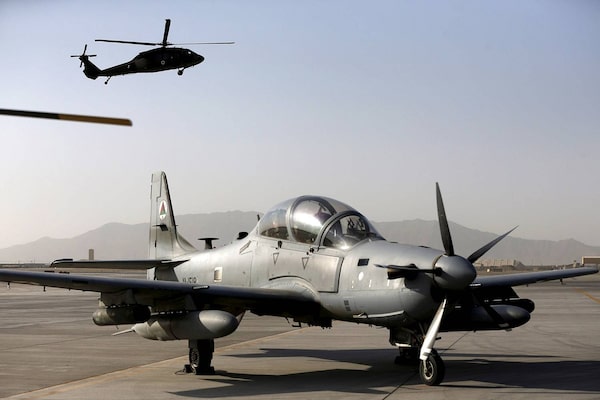
A Blackhawk helicopter flies above a parked A-29 Super Tucano aircraft during a ceremony at the Kandahar air base in Afghanistan October 7, 2017.Omar Sobhani/Reuters
A former aide to Stéphane Dion when he was foreign affairs minister is speaking out about a major hole in the Trudeau government's proposed arms-control legislation, saying Canada must amend it to require the public disclosure of military exports to the United States.
Ottawa won't make public how much defence and security equipment is sold and shipped to American buyers annually but indications are that this trade amounts to as much as $2-billion each year. A portion of these goods are sometimes resold by U.S. customers to foreign buyers such as Saudi Arabia or Nigeria.
The Liberal government is moving legislation through the Commons that makes the legal changes necessary for Canada to accede to the Arms Trade Treaty, a global agreement to regulate arms exports. The government touts the bill, C-47, as a measure that would "enhance transparency" in this country's export controls.
The legislation does not, however, compel Ottawa to begin public reporting of defence sales to the United States. This line of commerce remains exempt from Canada's export-control disclosure rules.
Andrew Sniderman, who served as human-rights policy adviser to Mr. Dion until early 2017 – the minister has since been appointed to a diplomatic position – said inaction on disclosure of U.S. military exports is inconsistent with the spirit of the arms-trade treaty. "A key objective is to require reporting on all arms sales, not just the ones that are most convenient to report," he writes in an opinion piece for The Globe and Mail.
He said he's proud to have worked for the Liberal government but wants to see the proposed arms-control legislation amended.
"As the human-rights policy adviser to this government's previous foreign affairs minister, my job was to ask questions like: 'If we really believe in increasing transparency and accountability in Canadian arms sales, does it make sense to exempt all sales to our biggest customer by far?' " Mr. Sniderman writes.
He says Canadians should know more, for example, about how the Americans are selling Super Tucano ground-attack aircraft with Canadian-made engines to Nigeria.
"Fearsome military planes, for an often-ruthless government, powered by the Maple Leaf: This is business as usual and we keep no public record of it," Mr. Sniderman writes.
Canada each year makes public basic details of military exports to every country in the world except one: the United States. The vast majority of defence sales to American buyers go unreported and Ottawa offers Canadians little information on the value or variety of shipments.
"It is probably more than you think, and our hands may be dirtier than you know," Mr. Sniderman writes of U.S.-bound shipments.
"If we required reporting on all of our arms sales, Canadians could at least have an informed debate about where we should draw the line in our policies."
Bill C-47 makes no attempt to remove this exemption for the United States and require the tracking and publication of the value of shipments. The Department of Global Affairs said it doesn't even collect data on most military exports to the United States because Canada does not require companies to obtain export permits to ship weapons to Americans.
All the government will say is that "over half" of Canada's exports of military goods and technology each year head to the United States.
Canada exported an annual average of $782-million in military equipment to all other countries in the world over the past five years, according to data divulged in reports from the Department of Global Affairs. Ottawa's "over half" rule of thumb implies defence and security exports to the United States exceed $800-million annually.
But one of Canada's foremost arms-export monitors says data it's obtained indicate that annual sales to the United States total between $1.5-billion to $2-billion. Project Ploughshares bases this on information about contracts it gets from the Canadian Commercial Corporation, a Crown corporation that facilitate sales to the United States.
Telling Canadians how much this country ships to the United States would require a wholesale change in the bilateral relationship. Canada and the United States have had a defence production-sharing agreement in place since the 1950s. "As a result, most military items shipped between Canada and the United States do not require permits," the department of Global Affairs said in its 2016 report on foreign defence and security exports.
(In exceptional cases, as with the export of prohibited firearms such as automatic weapons, export permits are required for sales to the United States.)
As part of a deal finalized in August, the United States sold $593-million (U.S.) in warplanes and ammunition to Nigeria. This included a dozen A-29 Super Tucano warplanes, equipped with engines manufactured by Pratt & Whitney Canada, which is based in Longueuil, Que.
The deal did not require Canadian government approval because the products were not exported directly from Canada. The Pratt & Whitney engines are supplied to a Colorado-based company, Sierra Nevada Corp., which is the prime contractor for the Super Tucano sale to Nigeria.
With a report from Geoffrey York in Johannesburg
 Steven Chase
Steven Chase